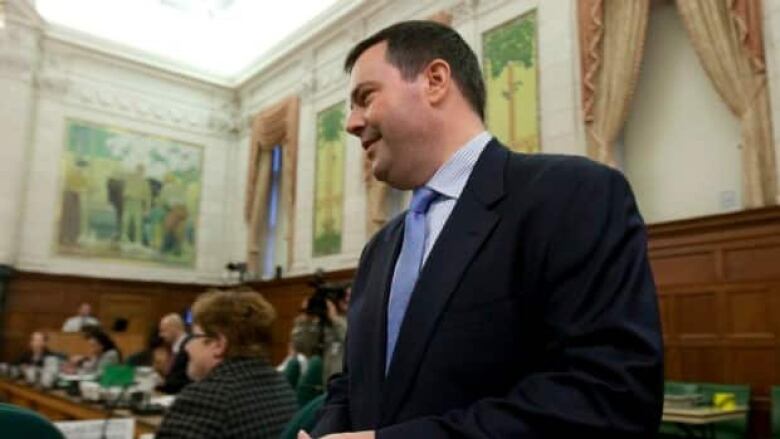Cut immigration applications to fix backlog, Kenney says

Canada needs to accept fewer applications from people wanting to live here, Immigration Minister Jason Kenney says, and he's eyeing the family class for cuts.
Canada is facing too big a backlog and, despite accepting 254,000 applications every year, there areone million people who are waiting to hear whether they can move to Canada, the citizenship and immigration minister said Thursday.
Canada gets about 420,000 applications every year and refuses about 10 per cent of those.
Speaking to the House committee on citizenship and immigration, Kenney said processing applications faster won't fix the backlog problem. And it isn't possible to accept enough people to deal with it either.
The only options, he said, are to vastly increase acceptances, or take fewer applications and keep processing the ones already received.
"Those are the only two possible solutions. It's a math problem," Kenney told reporters after the committee meeting.
Cut family class applications
Kenney pointed to the family class, under which parents and grandparents of Canadian citizens can immigrate. His department received 37,500 applications in 2010 but admits 18,500. Right now, there's a 10-year wait time for processing.
"Merely for us just to tread water, we would have to double the number of people coming into that program and that wouldn't even reduce the backlog," he said.
Kenney said other countries require a minimal family income, private health insurance or a bond to limit parent and grandparent applications.
Immigration lawyer Richard Kurland said Kenney's right to suggest a cap on the parents and grandparents category.
"Unless you solve the intake problem, you're going to have a growing backlog with growing processing times and it's time to bite the bullet," he told reporters after the committee meeting.
Kurland said a 20,000 cap is appropriate, and that the government should break the applicants into categories.
"Bring in as priority one the single parents overseas. Prioritytwo is you bring in parents where the families can pony up $75,000 up front to defray medicare costs, either with permanent resident visa on payment or[for $75,000]give that family a 10-year visitor visa to Canada and that way they can be here waiting until their number comes up in the immigration inventory overseas."
Speaking to Rosemary Barton on CBC's Power & Politics, Kenney called the $75,000 payment "a very interesting idea."
"Ive heardsimilar ideas about asking people to share in a greater portion of the social and health-care costs. And maybe thats one practical way of bringing more fairness while limiting the number of new applications so we can avoid the big backlogs. Thats a very valid idea," he said.
The Conservative government and previous Liberal governments averaged about 18,000 parent and grandparent entrants a year, he added.
Kenney says the department is launching consultations on cutting the backlog.
NDP immigration critic Don Davies said reducing parent and grandparent applications is the wrong way to go.
"What I object to the most is the minister has come into this so-called study, these meetings, with a preconceived conclusion. The only policy tool that he's looking at is capping applications. Well, that's not the only policy tool available to the minister," Davies said.
He wants Canada to accept another 100,000 immigrants every year, arguing a per capita measurement doesn't make sense because the country has so much space.












_(720p).jpg)


 OFFICIAL HD MUSIC VIDEO.jpg)
.jpg)



























































































